The excitement and promise of looking for a dream job can quickly slide into tired frustration. So, it can be all the more frustrating to identify a great prospect only to miss out on an interview due to the level of competition.
The UK jobs market has been up and down since the pandemic. Unemployment has reached near-record lows while wages have lagged behind inflation. The number of graduate vacancies grew by 6% in 2022-23 — but the average number of applicants per graduate job rose to 86, up 23% on the previous year. More generally, the number of vacancies continues to fall, but for some, it is still a jobseeker’s market — depending on your industry and region.
Regardless of your industry skill set, the best skill you can demonstrate when job hunting is just that: job hunting. The best talents don’t always get to the interview stage. The trick is to find the right jobs and submit a cover letter and CV that the HR team can’t ignore.
To get a better idea of how competitive the UK job market is right now, we at Resume.io have now zeroed in on the UK job market to see which towns and cities get the most and least applicants per job.
About this study
We analysed location-specific LinkedIn job ads posted in February 2024 for every UK town and city with a population above 50,000. For each job, we recorded the number of days the listing had been live, the number of applicants and the industry. We used these figures to rank cities and industries based on the average number of daily applicants per job.
Key findings
- London is the most competitive job market in the UK, with 11.01 applicants per job per day.
- Wallasey, Merseyside, is the UK’s least competitive job market, with 0.05 applicants per job per day.
- The most competitive industry across the UK is Venture Capital and Private Equity, with 23.69 applicants per job per day.
- The least competitive industry is Telephone Call Centres, with 0.10 applicants per job per day.
The UK towns and cities with the most competitive job markets
If you can make it there, you’ll make it anywhere: London remains an attractive proposition for UK and international professionals, be it for the historic glamour of the city or its perceived richness of opportunities — but it is also the UK’s most competitive job market.
The UK capital was voted the world’s most desirable city to work in 2021, but as well as being the world's top financial centre and a hotspot for cultural work, it is a major talent hub, and competition is stiff. We found that an average of 11.01 people apply for each London job every day, nearly twice the rate of second-placed Basildon (5.32).
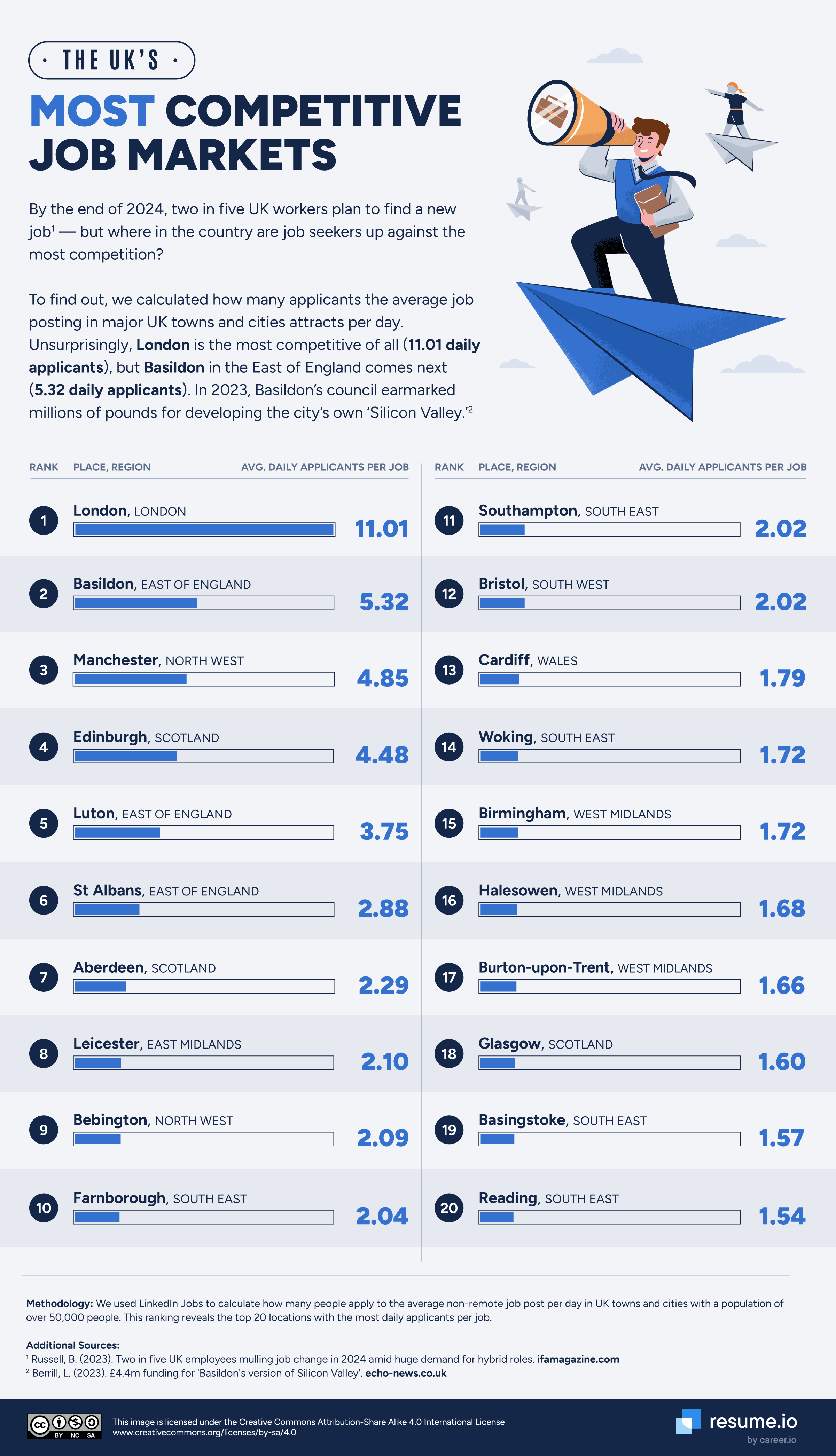
Edinburgh has the most competitive job market in Scotland, one of three Scottish places in the top 20. Each vacancy in Edinburgh attracts 4.48 applications daily, and only London, Basildon and Manchester are more competitive. The unemployment in Edinburgh is just 2.8%, significantly lower than the overall British rate of 3.7%.
The Social Mobility Commission recently found that people raised around Edinburgh, Manchester or London have the best chances of securing professional work as an adult. Along with neighbouring Glasgow, Edinburgh has enjoyed a surge in tech jobs in recent years — at one point, having the highest proportion of tech vacancies of any UK city.
The UK towns and cities with the least competitive job markets
We found three places with no more than one applicant per job every ten days: Wallasey, Clacton-on-Sea and Salford. Wallasey, on the Wirral in Merseyside, is the least competitive of all, with just 0.05 applicants per day. It is one of three Merseyside locations among the 20 least competitive; professionals from Wallasey and Bootle — and, to a lesser extent, Southport — may see Liverpool as a more appealing area to find work.
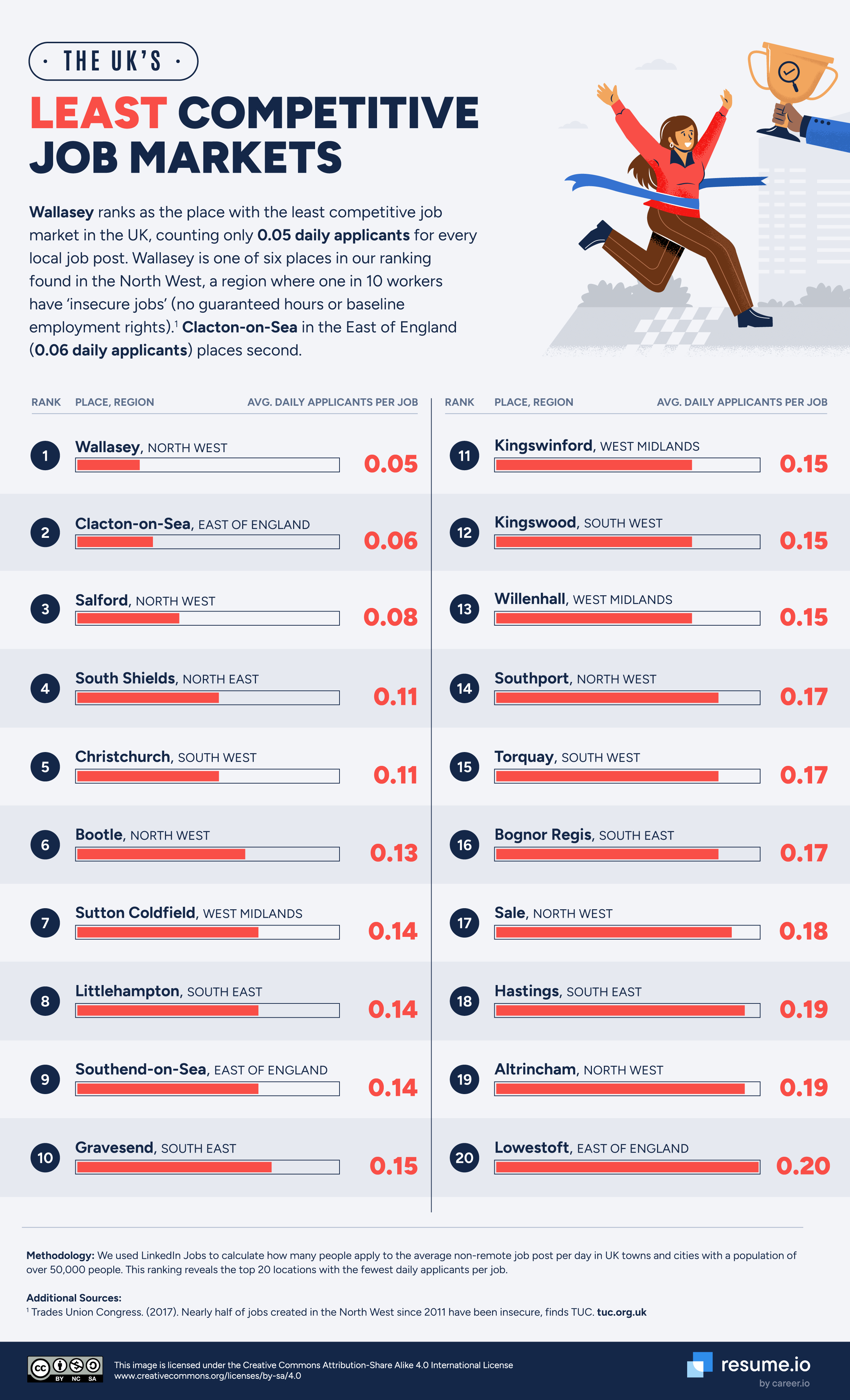
More than half (12) of the 20 least competitive job markets are in coastal towns. The population in small coastal towns shrank at twice the rate of small non-coastal towns between 2009 and 2018. Still, vacancies have also fallen drastically in recent months as the British public has returned to taking international holidays after the staycations of the immediate post-pandemic period.
Applicant numbers may remain low due to “Britain’s exit from the European Union [which] dried up immigration and the flow of workers to seaside towns,” according to a recent Bloomberg report. “That’s delivered a blow to hotels, restaurants and bars that depend on cheap labor [sic.].” The ageing population in these towns may also be a factor: “30% of the resident population in small seaside towns were aged over 65 years old in 2018 compared with 22% in small non-coastal towns,” according to the Office of National Statistics.
The most and least competitive job markets by region
Just one Welsh city makes the top 20 most competitive UK job markets. There are 1.79 applicants per job per day in Cardiff. The Welsh capital has the fastest-growing population of the UK’s 11 core cities, attracting up to 70,000 students per year. These students may be enticed to stay by Cardiff’s booming science and technology economy and thriving research and knowledge-sharing culture. At the same time, employment in the information and communication sector has also grown by 126% over the past decade.
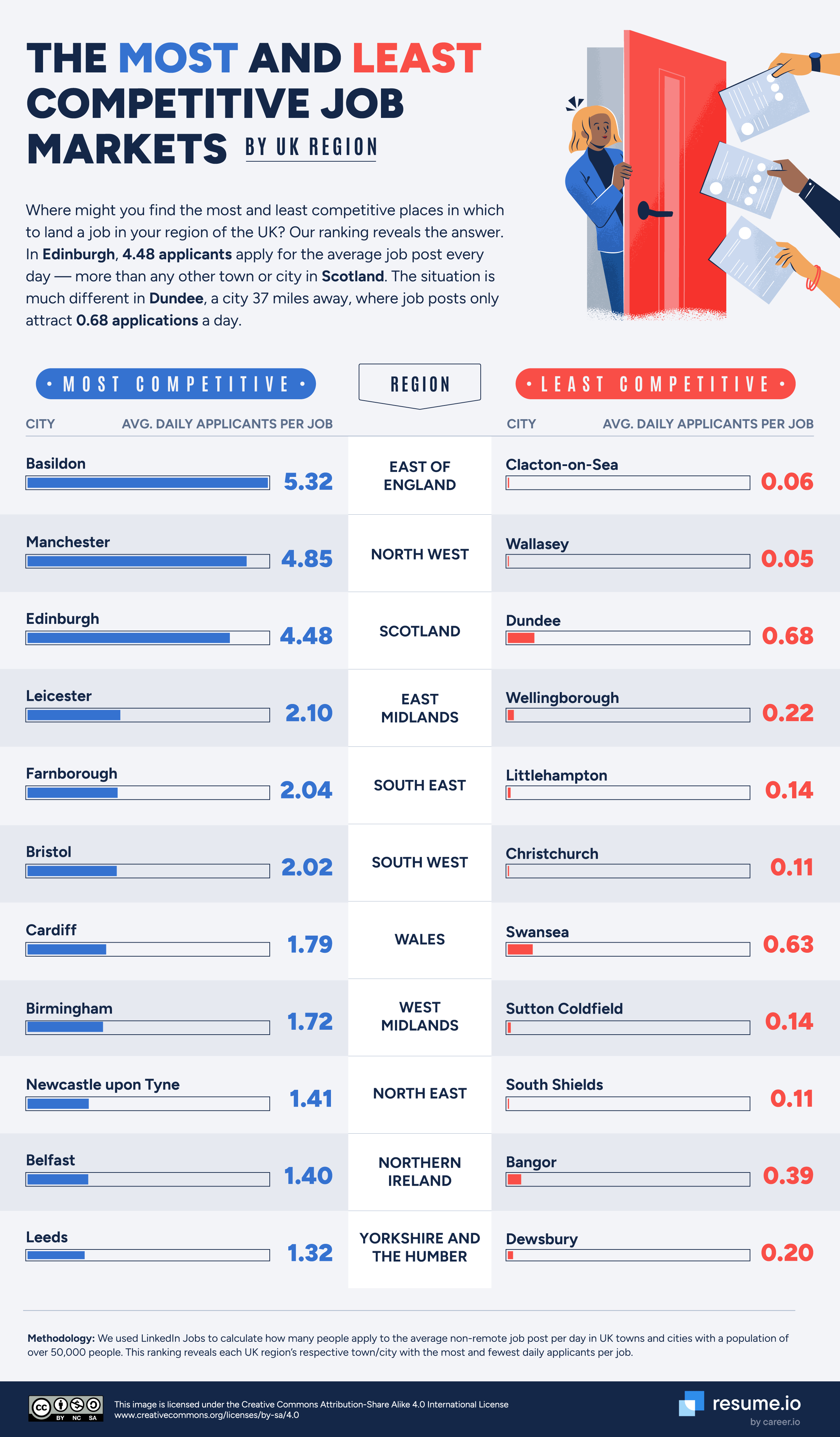
The County Down seaside city of Bangor is Northern Ireland’s least competitive job market. There are just 0.39 applicants for each vacancy every day. However, this is still too few to put Bangor or any Northern Irish location among the UK’s least competitive places.
Neither are any Northern Irish locations among the UK’s most competitive markets. The toughest job market in Northern Ireland is Belfast, where there are 1.40 applicants per job per day. As of summer 2023, one in three people in Northern Ireland were actively looking for new roles. The top motivating factors were higher salary (21%), work-life balance (9%) and improved skills (8%).
The most competitive job industries in the UK
Next, we looked at the industries that get the most applicants each day. The frontrunners are a mix of high-salary sectors, prestige positions and creative passions. Most in demand of all is work in Venture Capital and Private Equity (23.69 applicants per job per day).
According to Glassdoor, the average salary of a Private Equity Associate is £85,806 across the UK and £174,398 in London, the UK’s financial hub. Despite or perhaps because of the high applicant numbers, networking is seen as a key strategy for securing a good role in this sector, where roles can range from junior analyst to company director.
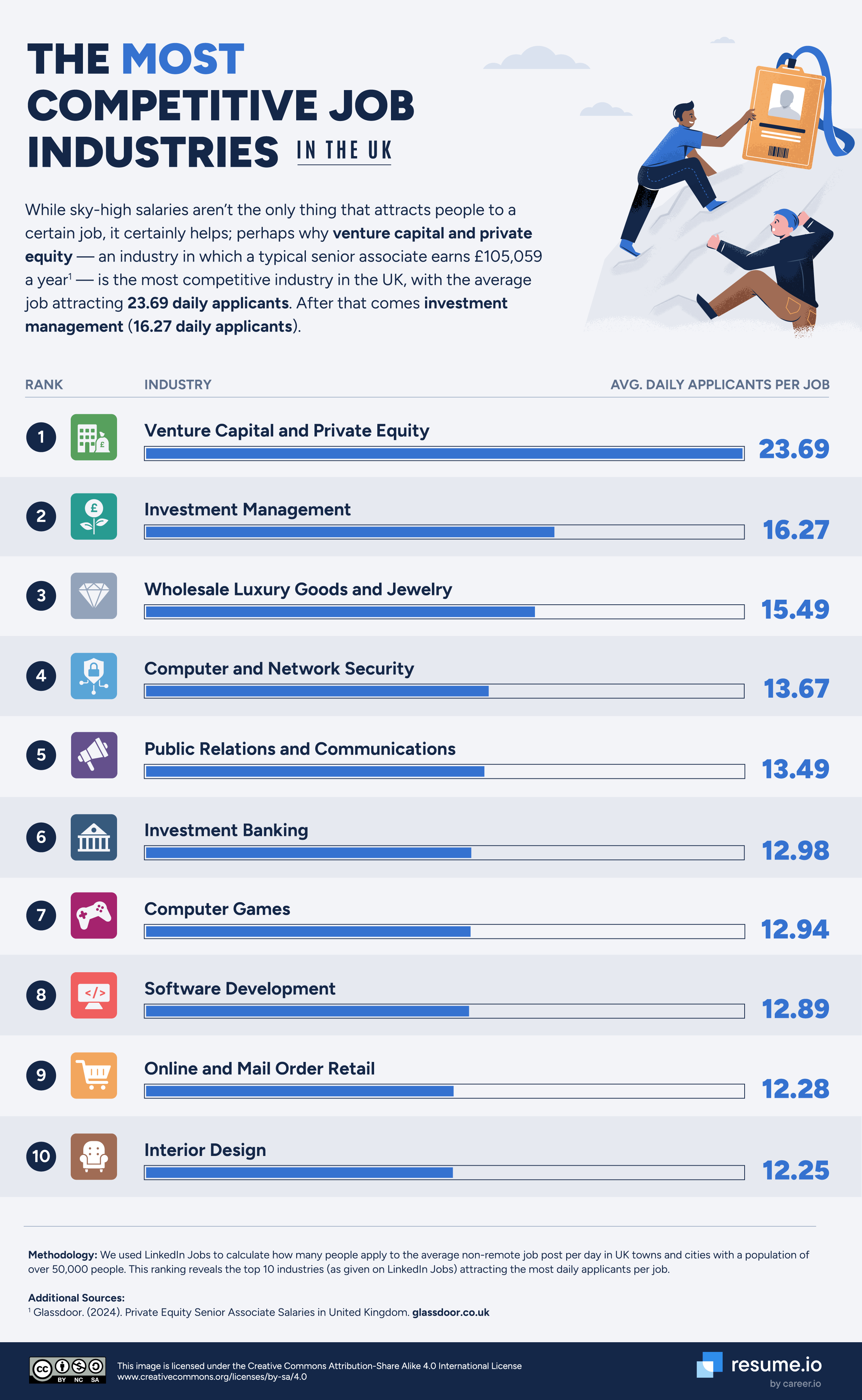
Computer Games (12.94), Software Development (12.89) and Interior Design (12.25) are among the creative industries with the biggest pull. Houzz reports that there has been an uptick in demand for workplace interior designers in the wake of the pandemic and the work-from-home revolution.
The average salary in interior design ranges from £18,000 at entry level to £45,000 for more experienced workers. However, experienced, entrepreneurial designers may command greater fees if they transition into freelance work.
The least competitive job industries in the UK
The UK’s least competitive industries include customer service, care and educational roles. Telephone call centre work is the least competitive, with one applicant per job every 10 days. The call centre has been described as “a place designed in a way that strips workers of their rights.” Strict targets and harsh discipline compound more general issues of low pay and the emotional labour of talking to customers who are either unhappy with the service or unhappy to be contacted.
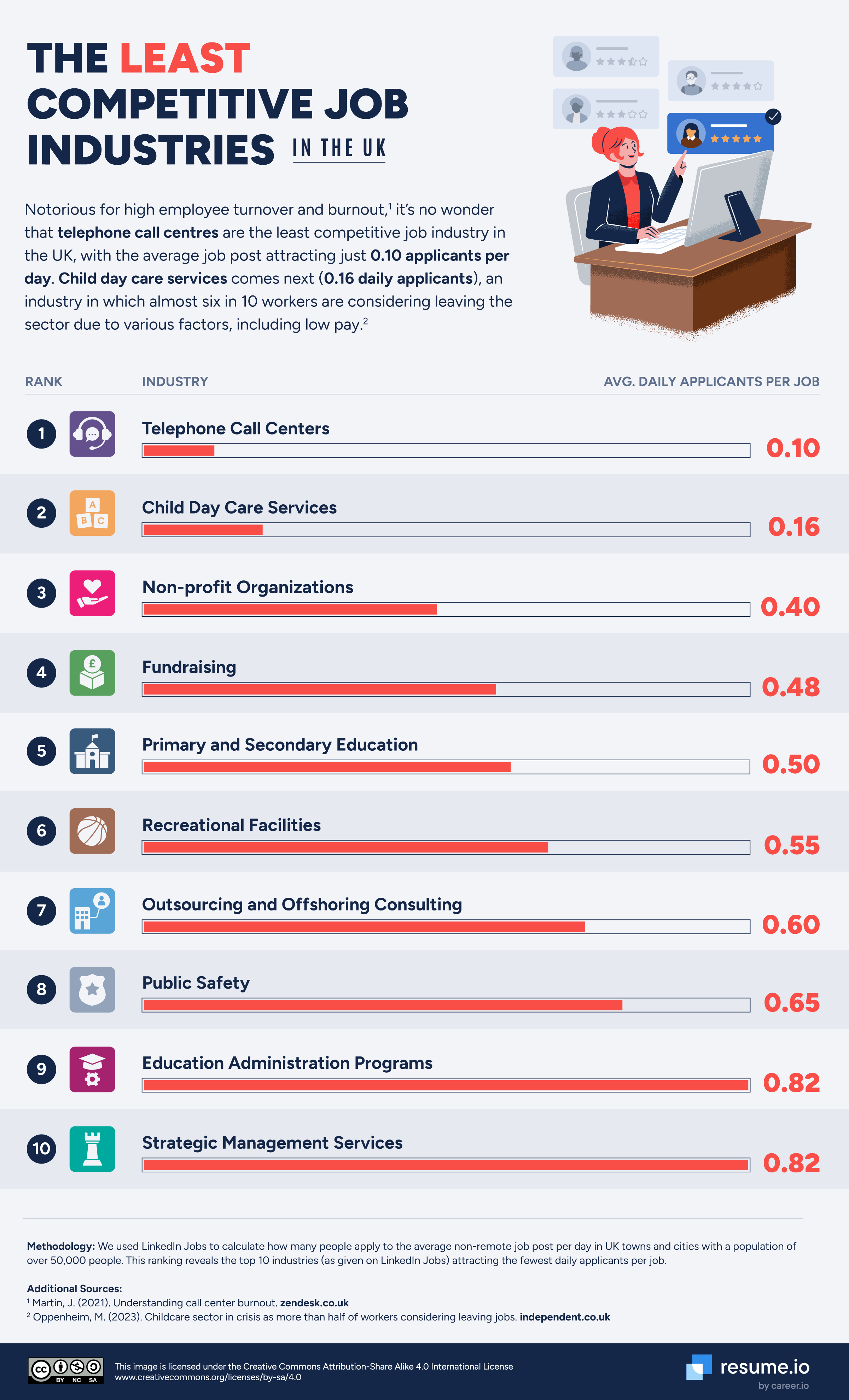
Jobs in Primary and Secondary Education get just one applicant every two days. In fact, reports suggest there is a shortage of jobs in primary education in Wales, while secondary teachers are in short supply — with much of the rest of the UK struggling for nursery, primary and secondary school staff.
“A double-digit percentage rise in the past few weeks to nearly 40,000 nursery, primary and secondary job vacancies shows the scale of the issues with pay, workload and conditions of service among teachers,” said Recruitment and Employment Confederation (REC) boss Neil Carberry in March 2023. “Schools are increasingly struggling to hire as the impact of several years of below-target initial recruitment plays out.”
How to make your CV stand out
Whatever your locality or industry, if you find yourself compelled to apply for a certain vacancy, others will, too. The employer will likely have dozens of applications to check through and may spend less than seven seconds on those that don’t jump out at them, so it’s essential to get your CV just right.
Try following these tips to give your CV the edge:
1. Keep it short
Every detail you include dilutes the rest of the page. So, tailor your CV to the role, including only relevant experience and keeping it to one or two pages with plenty of white space.
2. Make it professional
Your potential employer wants to know you take care with your tasks and have a proper sense of professional conduct. Before you even convince them that you’ve got the skills for the job, you should demonstrate your professionalism through correct spelling and grammar, neat formatting and a sensible email address. Only include social media handles if directly requested.
3. Customise your pitch
You don’t want just any job; you want this job. Prove it by addressing the hiring manager by name and editing your bullet lists of skills, experiences and past duties according to the present job description.
4. Optimise the layout
As exciting as recruitment can be, no hiring manager wants to spend their days looking at walls of Times New Roman text, hoping to find the relevant details. Create the perfect layout by setting your font to size 12 (14 for the headings), clearly marking and ordering the sections and setting line spacing to 1.5.
A great place to start composing the perfect CV is with Resume.io’s customisable CV maker and CV templates.
Don’t let a lacklustre CV get you lost in the pile. Take time and care to get it right. Your true time to shine will be when you get past the competition and show up for your interview.
“If you want your job application to stand out among the competition, it’s critical that your CV accomplishes three key objectives: present a compelling career narrative, strike a visual balance, and illustrate your unique value – all with a specific job opportunity in mind,” said Amanda Augustine, a certified career coach, resume writer and resident career expert for Resume.io. “Additionally, it’s important to ensure your CV is formatted to get past employers’ recruitment software, otherwise referred to as an applicant tracking system (ATS). Be certain to use clearly marked headers, avoid images and custom fonts, and incorporate key terms and phrases that appear throughout the job advert you’re pursuing.”
“In addition to customising your CV for each job opportunity, jobseekers facing serious competition in the market should put their networking skills to the test. Your chances of receiving a job offer increase tenfold if your application is accompanied by an employee referral. However, if you want to gain those coveted referrals, you must invest in your network. If you’ve neglected your professional network, now’s the time to reconnect with your current contacts and explore new ways to meet others in your targeted industry, city or company. Not only can your connections help your application get past the ATS and on to the hiring manager, but they can also provide insider information to help you successfully navigate the job interview process.”
Methodology
To find out which are the most competitive job markets in the UK, we looked at data from LinkedinJobs in different locations and industries. We filtered jobs to ensure they were posted during the last month and weren’t remote positions. We pulled a sample from every UK town/city above 50k population.
For each job, we recorded the number of days the listing had been live, the number of applicants and the industry. This allowed us to rank cities and industries based on the average daily applicants per job listing.
Locations and industries with fewer than 20 listings were discarded. Our data is correct as of February 2024.
- Russell, B. (2023). Two in five UK employees mulling job change in 2024 amid huge demand for hybrid roles. ifamagazine.com
- Berrill, L. (2023). £4.4m funding for 'Basildon's version of Silicon Valley'. echo-news.co.uk
- Trades Union Congress. (2017). Nearly half of jobs created in the North West since 2011 have been insecure, finds TUC. tuc.org.uk
- Glassdoor. (2024). Private Equity Senior Associate Salaries in United Kingdom. glassdoor.co.uk
- Martin, J. (2021). Understanding call center burnout. zendesk.co.uk
- Oppenheim, M. (2023). Childcare sector in crisis as more than half of workers considering leaving jobs. independent.co.uk




